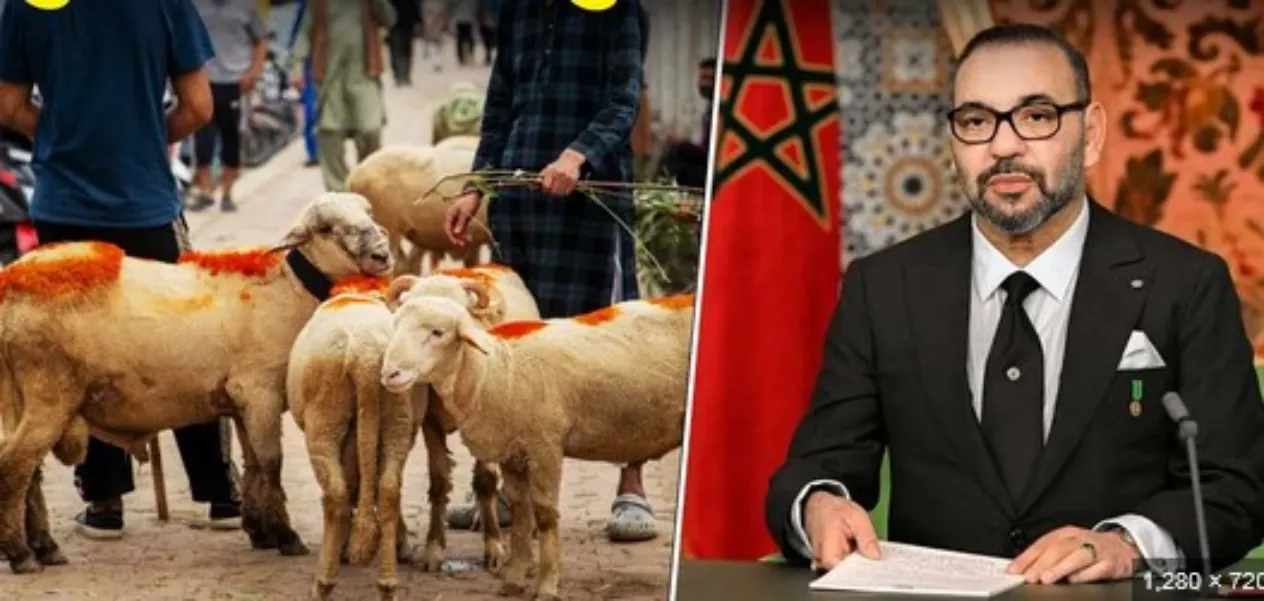
New Delhi
For the first time, Muslims in Morocco who constitute 99 percent population of the North African country are observing Eid al-Adha without the ritual of animal sacrifice. This comes in the wake of a royal directive by under Mohammed VI, amid deepening economic hardship and an agricultural crisis.
According to Middle East Eye, Morocco’s seven-year drought had reduced sheep herds by 38 percent and accordingly, the price of the animal for sacrifice has drastically increased. Last year, prices reached around $600, which is about 7.5 dollars per kilo.
Morocco’s average monthly wage is 3,100 dirhams ($335), making the cost of sheep unaffordable for the most. Morocco is a monarchy with Islam being its state religion..
Eid al Adha commemorates the willingness of Prophet Ibrahim to sacrifice his son at God's command. Muslims mark this Eid by slaughtering a sheep or other animals sharing the meat among family and donating some to those less fortunate ones.
In response, King Mohammed VI announced in February through a letter read by the minister of Islamic affairs that families should abstain from slaughtering a sheep this year. It read that the king would perform the Eid sacrifice on behalf of the people.
“Performing it under these difficult circumstances would cause real harm to many of our people, particularly those with limited income,” the letter read.
Earlier during the rule of the late King Hassan, Eid sacrifice was banned three times for similar reasons or in the aftermath of the war with Algeria.
The king in Morocco, known as Amir al-Muminin, (Commander of the Faithfuls) has precedence over decisions including religious activity. Mohammad Jadri, , a Moroccan economist and director of the Observatory of Government Action, a think tank, believes the cancellation of the sacrifice could generally be beneficial.
“We know today that the purchasing power of many citizens has severely declined. Therefore, cancelling Eid al-Adha could spare these individuals from spending financial resources,” he told Middle East Eye.
“Cancelling the sacrifice would “ease the burden on those who suffered last year, where livestock reached record levels exceeding $500 to $600 per head,” he added.
Small-scale farmers and agricultural workers will be the most impacted by the royal decree, the economist said.
“Rural communities rely heavily on the Eid al-Adha season, especially during dry agricultural years. For many, Eid is an opportunity to make up for losses in farming and crop production.”
In Morroco, around 230,000 livestock are slaughtered for Eid.
“Our livestock population is not expected to fully recover before 2027, so not slaughtering sheep this year could help recover the national herd,” Jadri said.
Fatima, who runs a laundrette business in Rabat, talked about the emotional and financial weight of those who cannot afford a sheep.
“This is not a normal situation for Morocco, I know many families who cannot buy a sheep this year,” she told MEE, describing the feeling as very “dehumanising for these families”.
For her, the king's statement signalled strong leadership.
“The king’s words show he is reflecting on the issue in Morocco and acting, he is showing true Islamic values in practice by taking the pressure off people and thinking of the less fortunate. This is a beautiful thing,” she said.
Normally, a month or even more leading up to Eid, huge signs line the supermarket aisles advertising the necessities for the celebration, including sharp knives, grills and meat skewers for barbecues.
Abdelali, from the rural Benslimane province, highlighted the notable reduction in Eid-related marketing and equipment leading up to the event this year.
“I’m in a Marjane chain supermarket right now. Eid tools are barely being displayed, space is minimal compared to previous years, and the marketing is discreet, if not absent,” he told MEE.
“If you didn’t know better, you wouldn’t guess Eid is around the corner.”
According to Abdelali, going against the king’s will to abstain from Eid sacrifice “would cause even more outrage among social circles".
“The prayers will still be done, families will still reunite, only the blade will remain clean,” he said.
ALSO READ: Civil servant couple Anjum Ara, Yunus Khan show the way to honour fallen soldiers
While many Moroccans appear to perceive the king’s decision as a wise measure, in a country where public criticism of the monarch is rare, others with the financial means have found ways around the decision.
